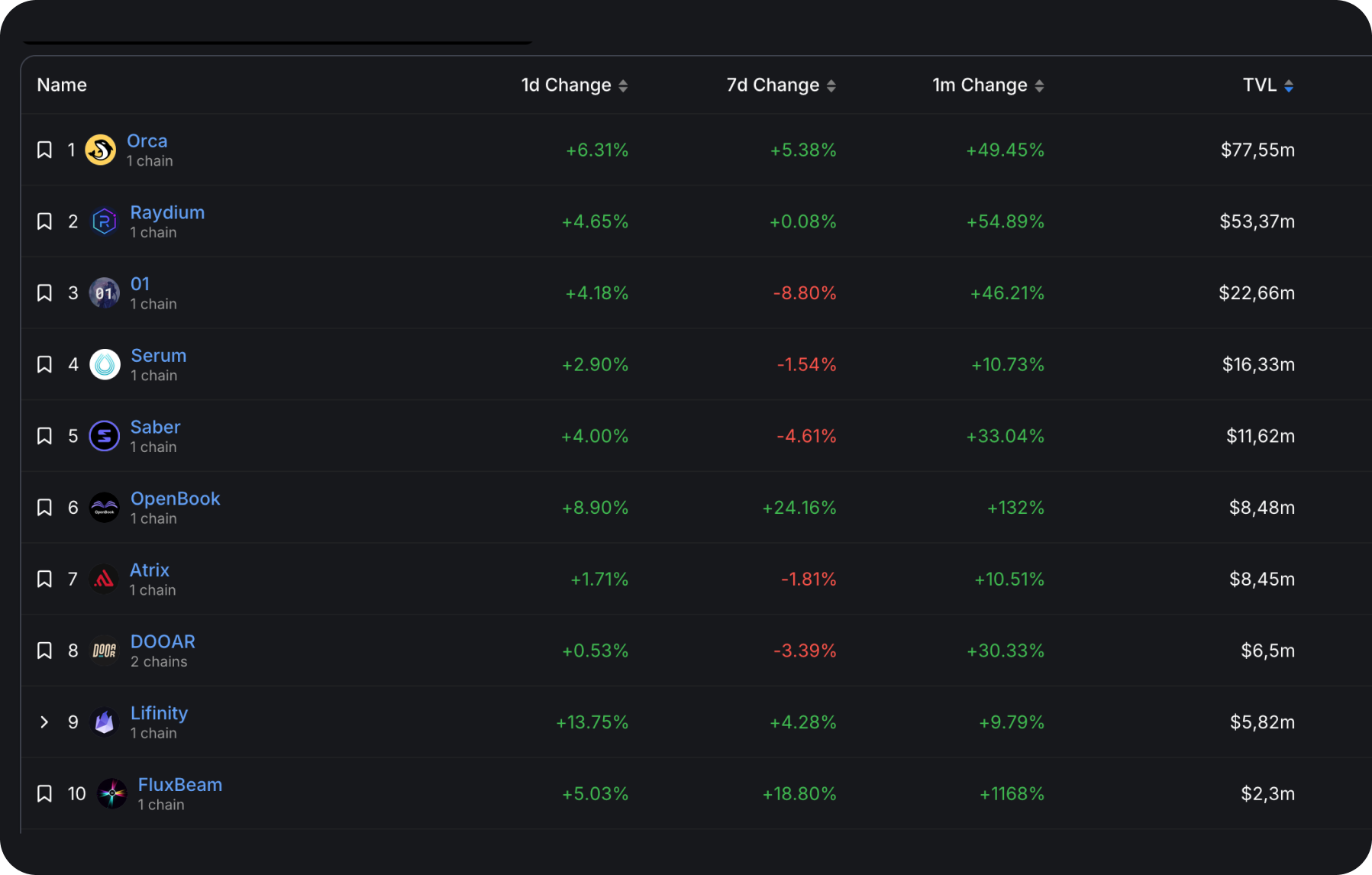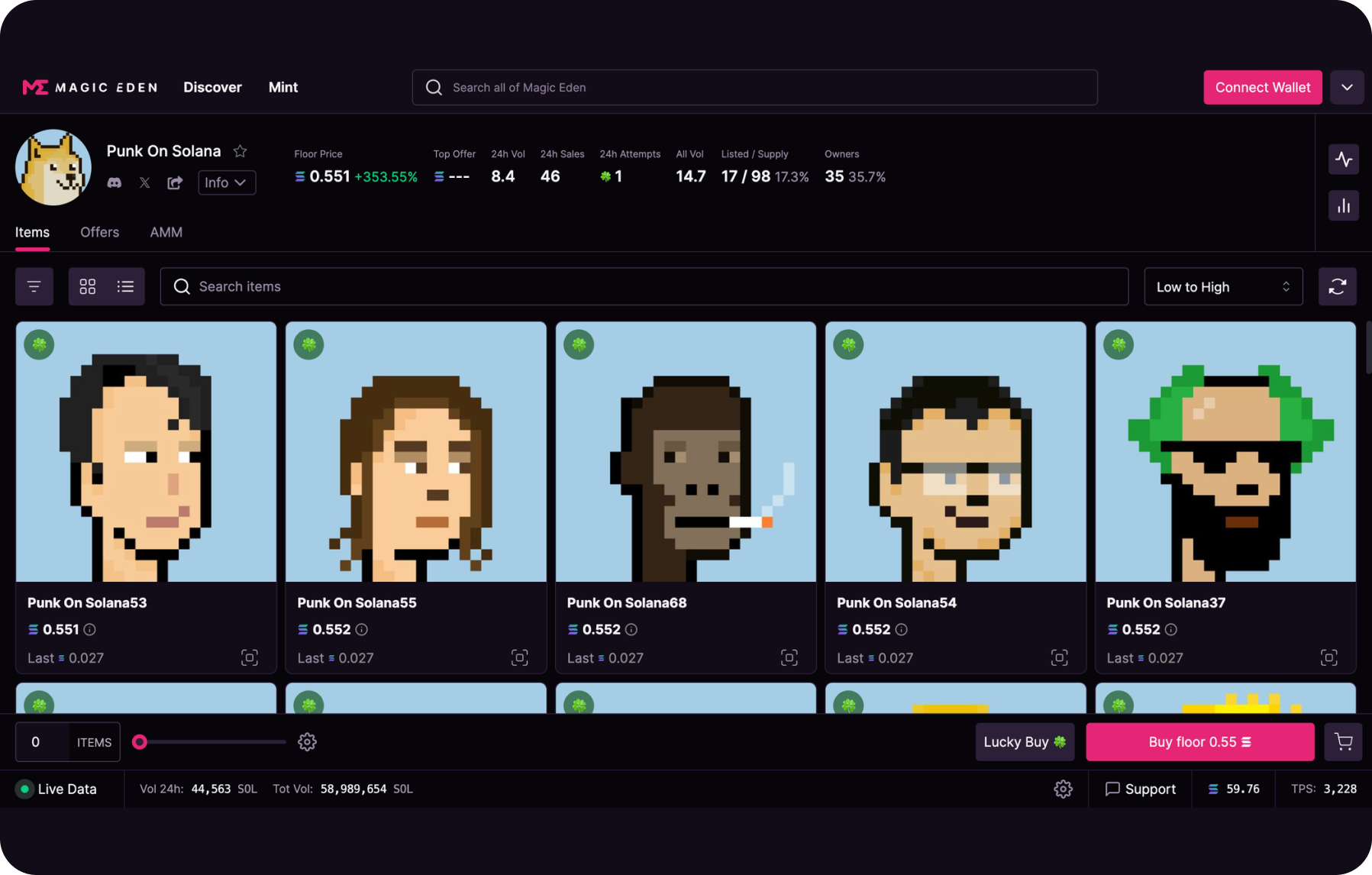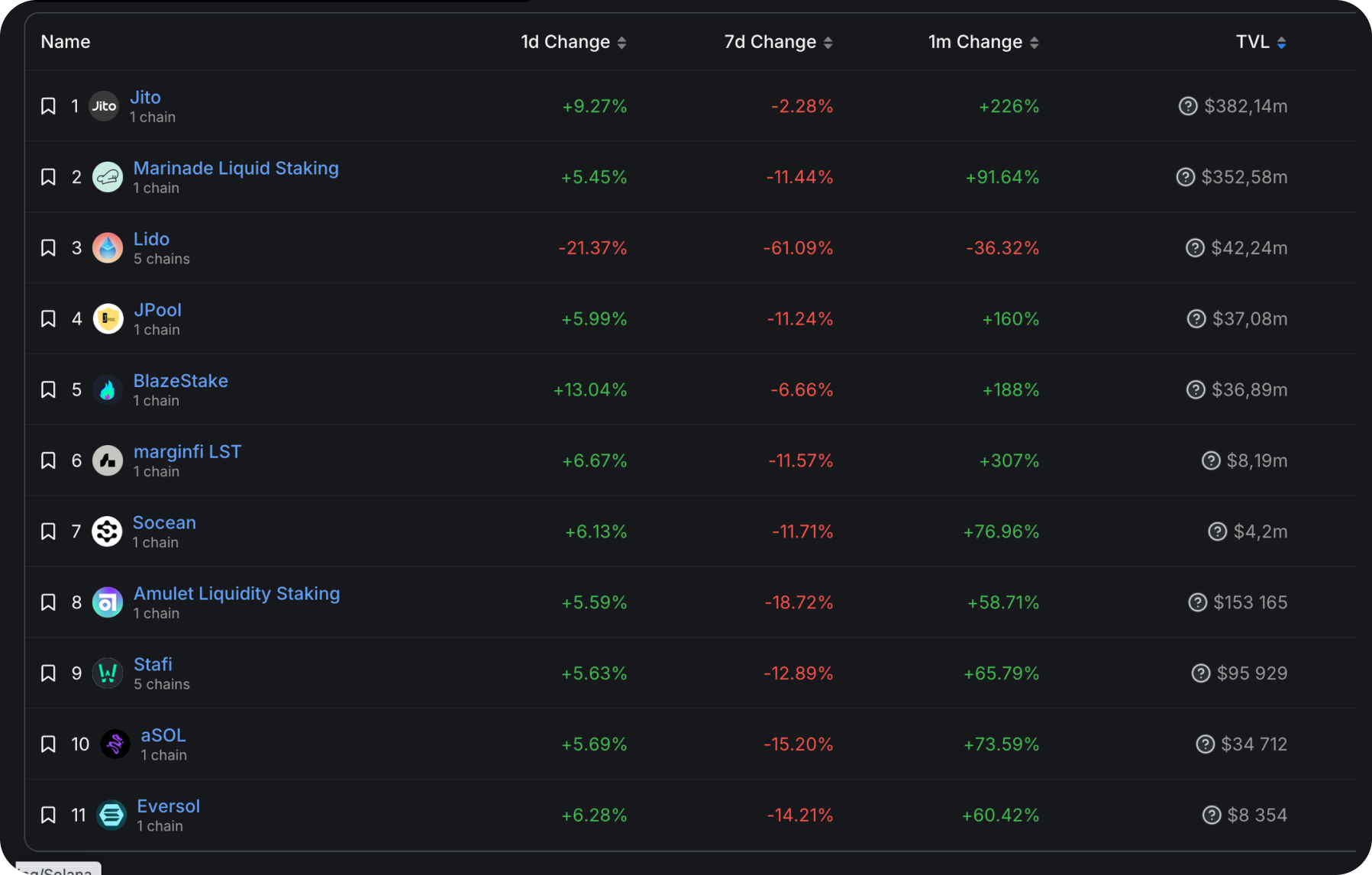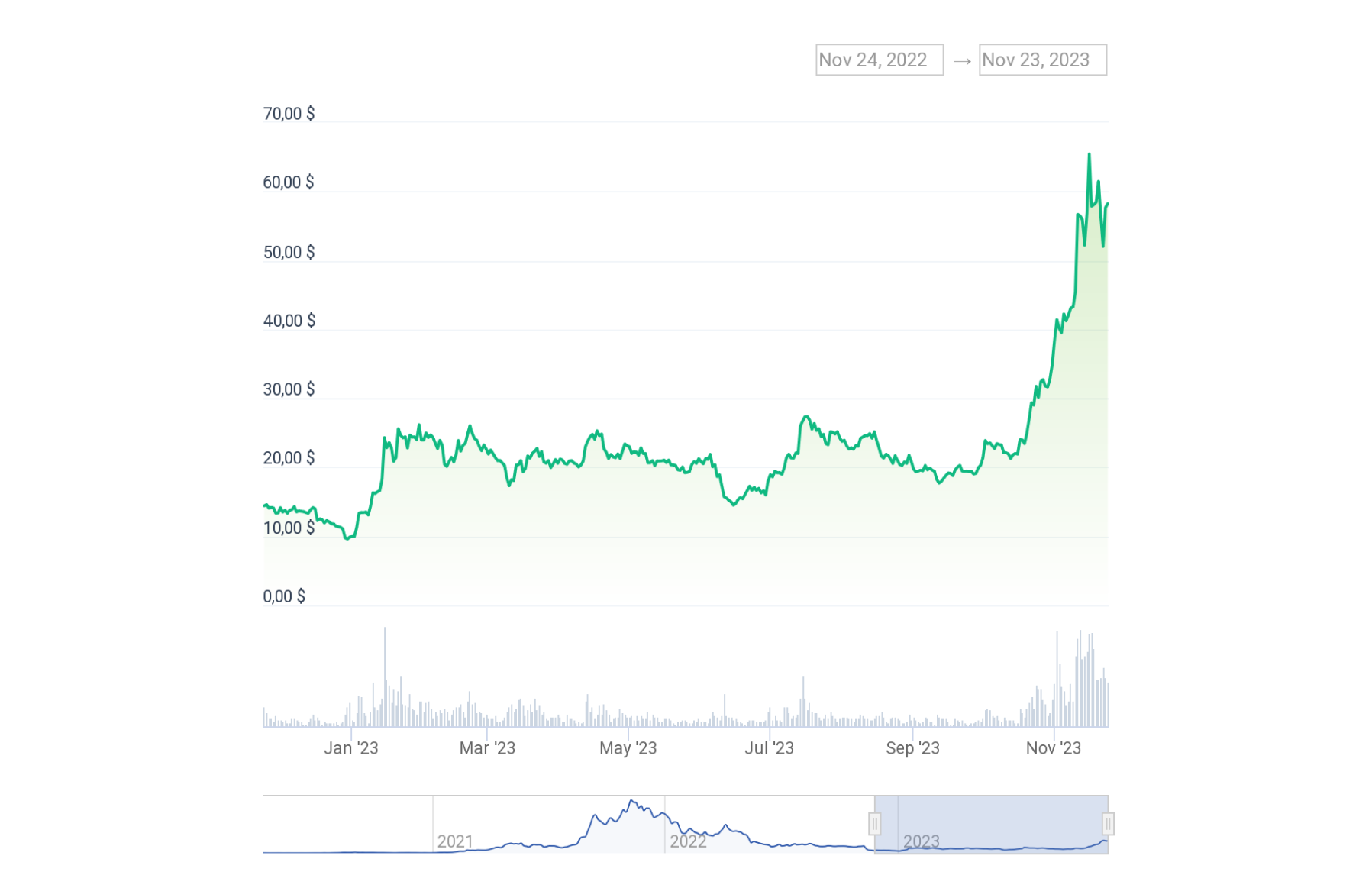Solana Blockchain Ecosystem Review
Key Insights
- Solana's unique blend of PoH, PoS, Tower BFT, and turbocharged replication ensures high throughput and low fees, making it a top choice for high-performance DApps.
- Solana's SDK, built around Rust, SPL, CLI, and extensive documentation, empowers developers to create efficient smart contracts and diverse applications on the network.
- Solana hosts DEXes, NFT marketplaces like Magic Eden, staking platforms, SOL crypto, and more, fostering a versatile ecosystem catering to various blockchain needs.
What Is Solana Blockchain
The Solana Blockchain is an innovative distributed ledger that provides outstanding performance and low fees thanks to the application of several key technological solutions. Let's take a closer look at Solana’s main components.
- Solana Architecture
Solana utilizes a unique combination of Proof-of-History (PoH) and Proof-of-Stake (PoS). Proof-of-History precedes the ordering of transactions before they enter a block, significantly reducing the time required to confirm a transaction. PoS is used to achieve consensus and ensure the Solana network security.
- Solana Proof-of-History (PoH)
Proof-of-History creates a chronological order for transactions before they're included in a block. This reduces the burden on blockchain validators, enhancing network performance.
- Solana Proof-of-Stake (PoS)
Proof-of-Stake allows coin holders to delegate them to validators to participate in the block creation process and consensus formation.
- Solana Tower BFT (Byzantine Fault Tolerance)
This security layer protects against malicious actions and attacks on the network, strengthening the level of trust in the ecosystem.
- Turbocharged Replication
The Solana blockchain employs an efficient mechanism for replicating data between blockchain nodes, ensuring high network availability and reliability.
- Linear Scalability
Solana provides linear scalability in performance as the number of nodes in the network grows, enabling high throughput with increased load.
Solana aims to create infrastructure capable of processing thousands of transactions per second at low transaction costs. This makes the Solana blockchain attractive for various DApps and projects, striving to enhance the efficiency and accessibility of decentralized systems.
Solana SDK
Solana SDK is a suite of tools and libraries designed for developing smart contracts on the Solana blockchain. Here's a closer look at the main components of this toolkit.
- Rust Programming Language
Solana SDK provides support for the Rust programming language for writing smart contracts. Rust is known for its performance and security, making it an attractive choice for building decentralized applications.
- Solana Program Library (SPL)
SPL is a collection of ready-made libraries and templates for developing smart contracts on the Solana blockchain. It includes token standards, asset management systems, and other foundational functions.
- Solana Command-Line Interface (CLI)
Solana CLI offers developers a convenient command-line interface for interacting with the Solana blockchain, deploying smart contracts, and managing assets.
- Solana Documentation and Guides
Solana SDK is accompanied by comprehensive documentation, including getting started guides, code examples, API interfaces, and other resources to help developers understand and utilize Solana's capabilities for their projects.
- Solana Community Development
Solana actively supports its developer community by providing forums, chats, and other resources for exchanging experiences, solving problems, and discussing new ideas.
Solana SDK plays a key role in developing decentralized applications and smart contracts on the Solana blockchain. By leveraging Rust and offering a wide range of tools, the SDK simplifies and accelerates the process of creating high-performance and secure decentralized applications on the Solana platform.
Solana Runtime
Solana Runtime is a virtual machine responsible for executing smart contracts on the Solana blockchain.
- Execution of Smart Contracts
Solana Runtime provides an execution environment where smart contracts developed using the Solana SDK can be launched and execute their logic. This includes transaction execution, data processing, and interaction with other contracts and assets on the network.
- Efficiency and Performance
The Solana VM is designed with a focus on high performance and execution efficiency. This enables fast execution of smart contracts, which is particularly crucial for applications requiring high throughput and low latency.
- Integration with the Solana Blockchain
Solana Runtime is tightly integrated with the Solana blockchain, interacting with other key components such as consensus mechanisms, token management systems, and security services. This ensures consistency and security in contract execution.
- Resource Management Systems
The VM manages the allocation and management of resources required for executing smart contracts, such as computational power and memory. This aids in optimizing resource utilization and preventing abuses.
- Solana Runtime Security
The virtual machine ensures the security of contract execution, preventing potential vulnerabilities and attacks on the Solana network.
Solana Runtime is a pivotal component that ensures the execution of smart contracts on the high-performance Solana blockchain.
Its efficiency, integration with other blockchain elements, and adaptability make it a fundamental element within the Solana ecosystem for developing and deploying decentralized applications.
Solana DEX
Solana DEXes are decentralized crypto exchanges on the Solana blockchain where users can exchange tokens without intermediaries.

- Decentralization
The Solana DEX is decentralized, meaning there's no central authority or intermediary involved in the transaction process. This ensures transparency, control over one's assets, and reduces risks associated with centralized exchanges.
- Solana Liquidity Management
Decentralized exchanges on Solana offer mechanisms for liquidity management, allowing users to provide their funds in exchange for rewards (Lite Pools, farming).
- Smart Contracts
Token exchanges on the Solana DEX are facilitated through smart contracts programmed in Rust language using the Solana SDK. This ensures security and automates the exchange processes.
- Cross-Chain Swaps
Some decentralized exchanges on Solana may support cross-chain swaps, enabling users to exchange tokens between blockchains.
- Solana DEX Open-Source Code
Many projects creating decentralized exchanges on Solana openly publish their source code, allowing the community to verify the exchange's security and integrity.
- Liquidity and Farming Functions
Certain decentralized exchanges on Solana offer additional opportunities for participating in liquidity provision and farming, which can be attractive for those looking to earn additional tokens by providing liquidity.
- Raydium
Raydium is a platform and Automated Market Maker that operates on the Solana blockchain, providing liquidity pools and enabling users to swap, trade, and provide liquidity for various tokens. Raydium's key feature is its integration with Serum's order book, combining the efficiency of an AMM with the depth of a centralized exchange.
Solana DEXes provide users with the means for secure and decentralized token exchange on the Solana blockchain. These exchanges play a crucial role in developing the decentralized finance ecosystem on the Solana platform.
Solana Token Standards
Solana Token Standards refer to established agreements and protocols for creating and managing tokens on the Solana blockchain. One of the primary standards developed for this purpose is the Solana Token Program Library (SPL).
- Solana Token Program Library (SPL)
SPL is a program library for token operations on the Solana blockchain. It provides standard protocols and contracts for creating, transferring, storing, and managing tokens, ensuring a unified and standardized approach to token handling within the Solana ecosystem.
- SOL Token Standards
SPL defines standards for various types of tokens on the Solana blockchain. These standards may include the Fungible Token Standard, Non-Fungible Token Standard, and others tailored to different token categories.
- SOL Token Creation
SPL offers guides and tools for creating new tokens on the Solana blockchain. Developers can utilize these standards to issue their tokens, specifying parameters such as total token supply, symbol, decimal points, and more. The Solana token is a part of a Broad-Ranging Crypto Portfolio.
- SOL Token Transfer and Exchange
SPL ensures standards for secure and efficient token transfer among network participants. This includes protocols for token transactions as well as standards for decentralized exchanges and swaps.
- Integration with Other Protocols
Token standards can be seamlessly integrated with other decentralized applications and protocols on the Solana blockchain, providing a broader spectrum of possibilities for token utilization.
- SOL Token Management
SPL provides functionality for token management, including capabilities for freezing, thawing, burning tokens, and other token administration operations.
Token standards based on SPL offer a unified and convenient approach to working with tokens on the Solana blockchain. This promotes standardization and compatibility among different tokens, making them easier to use and integrate into various applications and services.
Solana NFT Marketplaces
NFT platforms on the Solana blockchain like Magic Eden are online resources where artists, collectors, and digital content creators can create, sell, and purchase unique digital assets in the form of NFTs.

- Creation and Uploading of NFTs
Users can create NFTs by uploading their digital creations and associating them with unique tokens on the Solana blockchain. This may include images, videos, music, virtual items, and other digital content.
- Selling and Buying NFTs
Solana-based NFT platforms provide mechanisms for the sale and purchase of unique tokens. Users can set prices, conduct auctions, or define other sale conditions for their NFTs.
- Solana NFT marketplace Interoperability and Standards
Some platforms adhere to NFT standards, ensuring compatibility with other services and wallets on the Solana blockchain and beyond.
- Ownership Management
NFT owners have the ability to manage their assets, including transferring ownership, selling, or setting terms of use for their tokens.
- Marketplaces and Galleries
Certain platforms offer marketplaces and galleries where users can discover, browse, and purchase NFTs from various artists and creators.
NFT platforms on the Solana blockchain play a significant role in supporting art culture and digital creative works, providing creators and collectors with new ways to interact and exchange digital assets.
Magic Eden Solana NFT Marketplace
The Magic Eden NFT marketplace is focused on non-fungible tokens within the Solana blockchain. It enables the trade, purchase, and sale of digital collectibles and artworks in NFT form.

Distinguished by its integration with the Solana blockchain, Magic Eden benefits from the network's reputation for speedy transactions and cost-effectiveness. Not only can one work with NFTs within the Solana blockchain, though, but also Bitcoin, Ethereum, and Polygon.
Known for its user-friendly interface and access to diverse NFT collections, Magic Eden has gained traction among creators, collectors, and traders involved in Solana-based NFTs. Magic Eden offers various collections by Mad Labs, Queks, and more.
Solana Staking Platforms
Solana staking platforms enable users to delegate their Solana coins to participate in the blockchain's consensus process and, in return, receive rewards.

- Solana Staking Delegation and Consensus Participation
Users can delegate their coins to support the consensus process of the Solana blockchain. This can involve participation in block creation and ensuring network security.
- SOL Staking Rewards
In exchange for delegating coins, users receive rewards in the form of additional Solana crypto. Rewards can be distributed based on various factors such as the amount of delegated coins, the duration of staking, and others.
- Various SOL Staking Options
Platforms may offer different staking options, such as flexible staking (the ability to withdraw funds at any time) or fixed-term staking (with additional bonuses for long-term participation).
Solana staking allows users to actively engage with the blockchain network, maintain its functionality, and receive rewards for their contributions. These platforms play a crucial role in incentivizing participation and supporting the decentralized Solana blockchain.
Solana Crypto (SOL)
Solana (SOL) is the official cryptocurrency of the Solana blockchain and plays a pivotal role within its ecosystem.
Users can get SOL on SimpleSwap.
The dynamics of the Solana as of writing can be seen on the Solana price chart below.

- Solana Coin Type and Standard
SOL crypto is native to the Solana blockchain and adheres to the SPL (Solana Token Program Library) standards, ensuring compatibility with other tokens in the ecosystem.
- Solana Coin Use Cases and Utility
SOL crypto has diverse applications within the ecosystem. Coin holders can utilize them to participate in the consensus process, delegate for staking, engage in protocol voting, and pay transaction fees.
- Solana Staking and Rewards
Solana holders can delegate their SOL to participate in the consensus process and earn rewards in the form of additional Solana crypto. This encourages network participation and supports its security.
- Solana Transaction Fees
SOL crypto is used to pay transaction fees on the Solana blockchain, incentivizing validators and ensuring efficient network functioning.
- Solana Protocol Voting
SOL holders can participate in protocol voting and decisions regarding the development of the Solana blockchain, ensuring democratic decision-making within the community.
- Solana Exchange and Liquidity
SOL crypto is traded on various cryptocurrency exchanges and is used for exchanging into other assets. The high liquidity of the coin contributes to its widespread use and participation in various financial operations.
The Solana coin (SOL) serves not only as a means of exchange and storing value but also as a crucial element for participation within the Solana blockchain ecosystem.
Its utility functions incentivize active engagement from holders in various blockchain processes, fostering the development and effective functioning of the Solana ecosystem.
Users can exchange all cryptocurrencies mentioned in this article for fiat or crypto on SimpleSwap.
The information in this article is not a piece of financial advice or any other advice of any kind. The reader should be aware of the risks involved in trading cryptocurrencies and make their own informed decisions. SimpleSwap is not responsible for any losses incurred due to such risks. For details, please see our Terms of Service.


